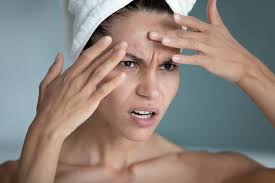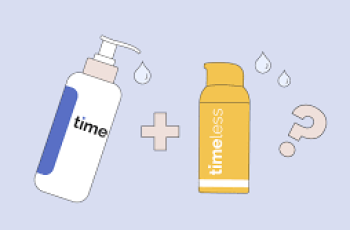
The Effects of Stress on Skin
Stress, Skin and How to Treat Your Stress Breakouts
The effects of stress on skin are not good. In the same way that stress can affect your mood, appetite and sleep schedule, it impacts the way that your skin functions. In order to understand the skins’ needs in times of distress, you must first understand how your skin reacts with it.
Stress, whether emotional, physical, or environmental, can manifest in a myriad of ways on our skin. At a physiological level, it triggers the release of the hormone cortisol. Elevated cortisol levels can lead to increased oil production, making the skin more prone to acne breakouts and other related conditions. Furthermore, stress can compromise the skin’s barrier function, reducing its ability to retain moisture and defend against external irritants and pathogens. This can result in dryness, sensitivity, and an increased risk of inflammatory skin conditions like eczema and psoriasis. Additionally, chronic stress can exacerbate pre-existing skin conditions and can accelerate the aging process, leading to premature formation of wrinkles, fine lines, and loss of skin elasticity. Beyond its direct effects, it can also influence skin health indirectly by disrupting sleep, leading to poor dietary choices, and reducing the motivation for maintaining a regular skincare routine. Thus, managing stress becomes pivotal not just for mental well-being but also for maintaining a healthy, radiant complexion.
Effects of Stress on Skin
Studies show that psychological stress is correlated with weakened skin barrier function, meaning that when you endure stress, your skin loses its ability to properly protect your skin.
Some signs of stress on skin are:
Acne
Bacterial or fungal skin infection
Dehydrated skin
Dry/Flaky skin
Dull Skin
Eczema
Face Flushing
Irritation on the skin
Itchy Skin
Psoriasis
Redness
Rosacea
what is the skin barrier
Skin Barrier Function
The skin barrier protects your skin from infection and dehydration and needs to be kept healthy in order to do its job. The weaker the skin barrier function, the more susceptible the skin becomes to allergens, and irritants.
Transepidermal Water Loss (TEWL)
TEWL is the measure of water that evaporates after passing through the outermost layer of the skin (the epidermal skin layer). More simply, it’s how much moisture your skin is losing. When your skin loses higher than normal amounts of water, it becomes dry and dehydrated.
If untreated, this skin can develop complications that require more nuanced treatment, such as:
Redness
Irritation and/or itchiness
Flakeyness
More pronounced wrinkles and fine lines
You might be experiencing additional stress because of skin conditions you already have
Skin Problems Increase Our Feelings of Stress
Many tools, like the Acne Disability Index and the Dermatology Life Quality Index, show that there’s a strong connection between how our skin looks and feels and our mental health. A study from 1966 to 2000 found that many people don’t realize how much skin problems, like acne or psoriasis, can affect someone’s emotions and daily life. People with these skin issues can often feel really sad or anxious, and this can seriously change how they live their lives. In fact, mental health problems play a big part in about 30% of skin conditions. For some, the stress of having these skin problems can even make them think about harming themselves. It’s essential to understand how someone’s skin issue affects their overall well-being.
environmental stressors
Environmental Stressors on Skin
Environmental stressors like pollution play a significant role in damaging our skin. Polluted air contains harmful particles and toxic chemicals that can settle on the skin’s surface. Over time, these particles can penetrate deeper skin layers, leading to dehydration, inflammation, and a weakened skin barrier. The long-term exposure can accelerate the aging process, resulting in premature wrinkles, fine lines, and an uneven skin tone. Moreover, pollution can increase the production of free radicals, which further damage skin cells and diminish the skin’s natural glow and elasticity. Protecting our skin from the harmful effects of pollution becomes essential in maintaining its health and youthful appearance.
How to prevent stress breakouts
Preventative Measures
The greatest way to reduce stress breakouts is to minimize stressors. If stress breakouts are common for you, consider ways in which you can nurture your mental health. Sometimes life gets in the way and psychological concerns are unavoidable, so you should consider the following ways that you can proactively protect your skin barrier.
Hydration
Staying well hydrated is crucial to maintaining your skin’s health. When we drink water, it is distributed and used to fuel different parts of the body. If the body does not get enough water, it eventually stops functioning well (and if we spend a hot summer day under the sun, this happens even quicker!). The skin operates the same way and when it lacks hydration, so does the skin. With dehydration comes weakened skin barrier function and reparability. To avoid dehydration, be sure to drink at least two liters of water each day.
Apply Sunscreen Daily
Wearing sunscreen daily ensures that your skin is protected by harmful UV rays which further weaken your skin barrier function. UV light damage can also lead to discoloration of the skin, pronunciation of dark spots, and worsened skin texture. Adding sunscreen to your routine not only protects your skin barrier from these visible effects but also fuels your skin’s ability to repair itself from damage.
Cut out Physical Stressors
While psychological stress is sometimes unavoidable, there are physical factors that can be impacting the way your skin reacts to stress. Consider switching to a gentle, fragrance-free cleanser, or a creamy cleanser. When possible use a humidifier in your home to add moisture in a dry climate. Small adjustments like these can help your overall skin health in the midst of psychological distress.
treating stress breakouts
Treating Stress Breakouts
Stress breakouts are inevitable and while we can do our best to prevent these break outs, we need a plan of action for treating them when they flare up. You should continue preventative measures even after a breakout occurs, most importantly keeping yourself well hydrated.
Re-Hydration
Psychological stress has been linked to the loss of moisture in the skin, particularly on the face. If you’re experiencing a stress breakout on your face, increase your daily water intake. Aside from water’s role in strengthening your skin barrier function, studies show that dehydration can lead to impaired mood/concentration, and general mental performance, which suggests that hydrating can actually curb thinking patterns that lead to psychological issues.
Moisturizing
Moisturizing is equally as important as drinking water to keep skin hydrated. Be sure to pick moisturizers that contain barrier repair ingredients.
Antioxidants
When we feel stressed, our body releases chemicals that can harm our skin. One of these chemicals is called free radicals, which can speed up aging and make our skin look tired or dull. Antioxidants are like our skin’s superheroes. They fight against these free radicals, helping to keep our skin looking fresh and young. By using skincare products with antioxidants or eating foods rich in them, we can help protect our skin from the negative effects of stress. This means fewer wrinkles, a brighter complexion, and healthier skin overall.
Bottom Line
Hydrate, moisturize, and nurture (your skin and your mind!). If you find yourself dealing with breakouts often, consider changes you can make to your day-to-day to mitigate stress or consult a medical professional to explore adjustments that can help. To curb and treat the breakouts you can’t avoid, be sure to drink enough water and make sure you are using the best skin care products for your Baumann Skin Type.


